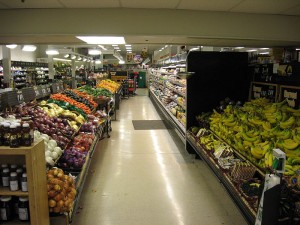Recently reading a report about a survey done by Tesco into food waste (see Guardian article), it struck me that there are some very simple, undemanding and everyday applications of the Middle Way here. According to this report, two-thirds of bagged salads and half of bakery items are wasted, thrown away either by supermarkets or by consumers.
Obviously there are lots of possible issues contributing to food waste: around supermarket selling policies, wider attitudes to food, consumerism and where we shop. But let’s set those aside for the moment and just focus on the choices of the shopper in the supermarket. Let’s think about what happens when we pick up a food item off the shelves.
aside for the moment and just focus on the choices of the shopper in the supermarket. Let’s think about what happens when we pick up a food item off the shelves.
One of the key points of Middle Way Philosophy is the recognition that we are not single selves, and that our egoistic identifications with present desires need integrating with our identifications at other times. Leaving aside whether we can apply this to long-term issues like pensions or nuclear waste, and even leaving aside identification with the ecosystem or with distant people on other continents, a more immediate question is – can you plan your consumption of food for the next week? If people can’t even do that, their chances of larger-scale integration seem to be limited.
Each time you put a new item in the shopping trolley, an act of imagination is required, linking your desires at different times. There is desire for that item now, yes, but will there be a desire for that item tomorrow, or in a week’s time? Will there be sufficient demand for that item, competing with other available items and limited hunger, within the time before the food goes off? Your theory that the item will be needed may seem OK considered in isolation, but it needs scrutiny in the light of the evidence and comparison with other theories – like the theories that several other items you’ve already bought will be needed at the same time. Attachment to a particular fixed idea of what you need or don’t need, regardless of the changing conditions (perhaps linked to other fixed ideas about the ourselves and the world) is an example of metaphysics. To overcome such rigid views, it’s not just planning and moral awareness that’s required (though that may help) but also the ability to imaginatively put yourself in slightly different situation for long enough to care about it.
Of course, there are lots of reasons why many people don’t go through this reflective process when shopping. One may be that they are under time pressure and don’t want to spend time dawdling around the supermarket thinking. That’s understandable, but means that we’ll have to establish rules of thumb for quick reference instead. For example ‘never buy more than one bagged salad’ sounds like a pretty obvious one to start with. Perhaps after one relatively slow and reflective turn around the supermarket, we can establish better habits that we then replicate more quickly on other occasions.
Anyway, better stop now – I’m off to the supermarket.
